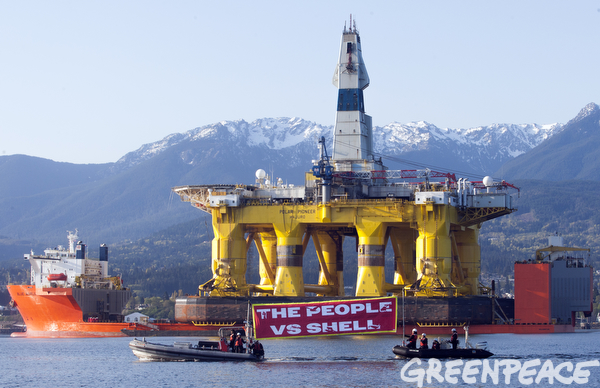Despite Devastating Environment Impact
Why Is the U.S. Opening the Arctic to Drilling?
May 18, 2015 | Revolution Newspaper | revcom.us
On Monday May 11, the Obama administration announced it had approved Shell Oil’s plan for drilling in the Chuchki Sea in Alaska’s Arctic Ocean. Now Shell only needs approval on the final drilling permits, likely no problem for them.
This decision is a complete outrage. The Arctic is melting. More than any other country, the U.S. has caused the buildup of greenhouse gases, bringing on global warming/climate change and threatening the planet and humans with catastrophe. Now, after bringing on such destruction by burning fossil fuels, the U.S (and other powers) are seizing on the melting to begin grabbing for newly accessible fossil fuels whose burning will make the situation even worse. Drilling in the Arctic threatens horrible oil spills in some of the last relatively pristine oceans on the planet. A major spill in the Arctic could ruin beautiful and precious species and ecosystems, and batter the way of life of the Inupiat people, who depend on these ecosystems. (See “The Fight to Stop Arctic Drilling, the Stakes for the Planet.”)
Any country, any government, any system that would make such a decision to drill in the Arctic, especially given the deteriorating state of the environment, is entirely, completely illegitimate.

Kayakers protest the Shell Oil drill rig in Seattle. Photo: Greenpeace
People broadly are shocked and pissed off at Obama’s decision, and rightfully so. This week, Shell moved one of its drilling rigs into Seattle’s harbor to load and prepare before towing it to Alaska to drill. Protests to oppose Shell have been called by sHell NO. Environmentalists plan to hold a kayak flotilla opposing Shell’s drilling rigs and also have vowed to shut down Shell’s work at Terminal 5, where the oil rigs will be loaded.
This is important and needs to be spread further to stop Shell’s and all Arctic drilling.
At the same time that there is growing opposition, many, including many environmentalists largely from the middle strata, cannot make sense of why Obama is doing this. A spokesperson for the Natural Resources Defense Council, for example, called Obama’s decision “inexplicable.” But this is not true. It can be explained. Yes, it’s entirely wrong and will cause further damage to the planet. But the reality is that Obama, and any representative of U.S. capital, as well as the capitalists of other countries, are compelled by the laws of capitalism to go forward, despite the damage this will cause.
But why is this so?
First of all, let’s just clear away some bullshit. In announcing this decision, Abigail Ross Hopper of Obama’s Bureau of Ocean Energy Management (BOEM) claimed it was based on a “thoughtful approach” and that the drilling “will continue to be subject to rigorous safety standards.” Bullshit! The BOEM itself admitted there was a 75 percent chance of oil drilling in the Arctic causing a major spill at some point. A major spill could ruin this ecosystem for decades—as did the Exxon Valdez spill in Alaska, which killed off much marine life, including some endangered Orca whale families that are now headed toward extinction. Before the Exxon Valdez spill, before the Gulf oil spill, oil companies and the government bodies that facilitate their exploitation of the Earth also claimed they had the means and were taking every precaution to guard against spills. And they didn’t. With all the talk from Obama and others about all the safety precautions they are taking since the Gulf spill, the truth is oil spills and accidents, derailings of exploding oil trains, pipeline ruptures, etc., have continued and even gotten worse. The Obama administration also signed off on Shell’s supposed ability to drill safely in 2012 and gave them the green light. Then, Shell’s Arctic drilling resulted in a series of fiascos: drilling rigs ran aground or caught on fire and Shell contractors committed multiple felonies by covering up safety violations and dumping pollutants into the ocean.
The truth is this: Drilling can’t be done safely, for two reasons. Drilling in the oceans, especially in deep water such as in the Gulf of Mexico, or facing the extreme weather, storms and ice of the Arctic, is inevitably dangerous and hard to control. In the Arctic, oil would be almost impossible to clean up. And even more, none of this can be done safely because what’s driving these actions is not regard for the environment and its protection, but the compulsion to make profit and to gain control of these resources and get them to market before some other country with some other company does. Protection of the environment—including safety—are simply obstacles and annoyances that have to be overcome in the pursuit of profit. Shell has sunk billions into this venture at great risk, while other companies have held back from starting to drill, judging the risks too great or the profits to be gained not yet clear enough due to the still-low price of oil. Shell is compelled to make good on this investment in its competition with other capitalists. A New York Times article details how Obama was “pre-occupied” with opening up the Arctic even as the Gulf oil spill was still causing shockwaves. Obama made it possible, the Times says, “to clear Shell’s path through the often fractious federal regulatory bureaucracy.”

This Revolution special issue focuses on the environmental emergency that now faces humanity and Earth’s ecosystems. In this issue we show:
- the dimensions of the emergency...
- the source of its causes in the capitalist system, and the impossibility of that system solving this crisis...
- a way out and way forward for humanity—a revolutionary society in which we could actually live as custodians of nature, rather than as its plunderers.
Read online....
Also available in brochure format (downloadable PDF)
But the stakes of all this are much bigger than any one company and its own profits. The Arctic is now seen by the world imperialist powers as one of the last great “prizes” to be fought over and grabbed. Tremendous wealth, profitability, and strategic power are at stake. A 2010 report from the Center for Strategic and International Studies, “U.S. Strategic Interests in the Arctic,” says Arctic ice melting “is responsible for the newfound profitability and geostrategic relevance of the region. Access to oil, gas, minerals, fish, and transportation routes formerly locked in by thick ice are, for the first time, becoming accessible and viable sources of profit.” This report tells how a shipping company that used the Northeast Passage along Russia’s Arctic coastline from South Korea to the Netherlands saved as much as $300,000 for each vessel trip due to cutting thousands of miles off their route which would normally have to go around the Asian subcontinent and through the Straits of Hormuz and the Suez Canal. Because of the immense melting in the region, passage through the Arctic is now often open in summer for the first time in recorded history.
The Arctic contains as much as 22 percent of the earth’s remaining undiscovered oil and huge quantities of natural gas, as well as many precious minerals. The world’s powers are engaged in and are beginning to ramp up a race over who can position themselves best to gain control over these resources and the vast wealth they contain—and over who can position themselves to be top dog “decider” over who gets what and the best conditions for their own country in relation to the newly opening shipping lanes. Growing voices in the U.S. ruling class feel the U.S. is falling behind in this race because they don’t have enough icebreakers and ships that can operate in the extreme conditions of the Arctic, and that they don’t have other needed “capabilities,” militarily and otherwise, to protect U.S. interests. Canada, Russia, and others are seen as “gaining advantage” over the U.S. Planners speak about the U.S. strengthening its position to be able to “resolve disputes” in the “shared Arctic commons,” but underneath this lies growing inter-imperialist rivalry over what the big powers view as a strategic prize.
The U.S. has already vastly expanded oil and gas production to become the world’s leader. And it is using these resources, as well as its lead in fracking technology, as a weapon in rivalry with other capitalist countries, for instance battling Russia over Ukraine. Control over Arctic resources means strategic power and domination. None of the great powers or big oil companies can afford to stand aside from the race to grab for this or else they will risk losing out, being driven down, and even under by competitors.
And this is not just about economic competition. The projection of military power—while not yet to the point of endangering a direct conflict, is a growing aspect of competition between the U.S., Canada, Norway, Russia, Denmark, and others like China, who are trying to find a way in.
A presidential directive put in place by George W. Bush, but continued under Obama, outlines a strategy requiring the United States “to assert a more active and influential national presence to protect its Arctic interests and to project sea power throughout the region.” Another strategic paper from the CNA Military Advisory Board said climate change was a threat to U.S. “national power” and advocated that the U.S. needed to step up its ability to project military power in the Arctic as it melts. (See “Climate Change and U.S. Global Supremacy.”)
This is the backdrop behind the decisions to allow Shell to open the way to drill in the Alaskan Arctic and thus open the way for others to rush in. This drilling is part of, and will accelerate, a rush by all the big powers to pry open and plunder the Arctic, while uttering false words about “safety,” “thoughtfulness,” and “environmental concern.” All of this shows more clearly why Obama is hardly the “environmental president” and even more, why this system is not capable of doing anything but destroying the Earth’s environment—no matter how blatant and dangerous the situation is.
Volunteers Needed... for revcom.us and Revolution
If you like this article, subscribe, donate to and sustain Revolution newspaper.






